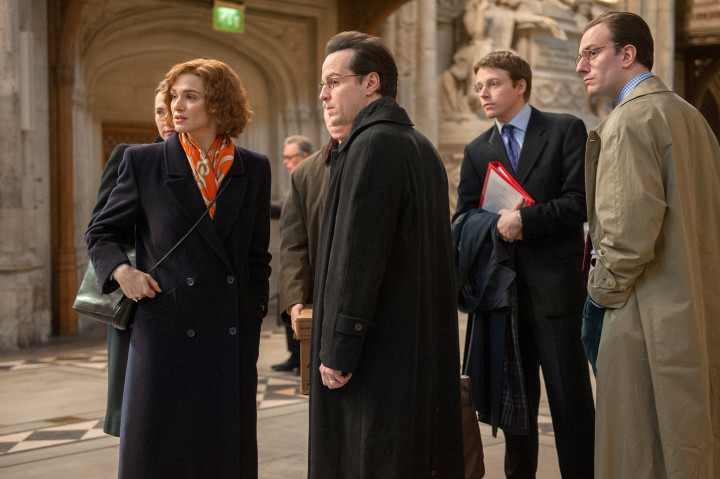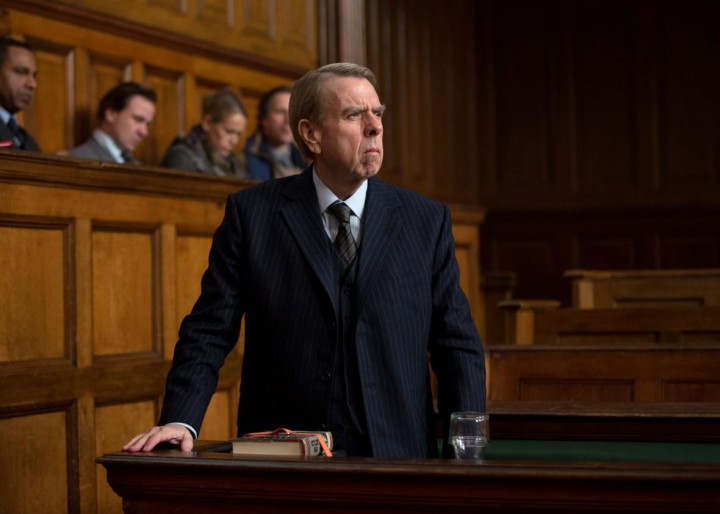There is an undeniably powerful story behind Denial, albeit one that occasionally gets lost behind a somewhat tepid telling. As far as courtroom dramas go, it’s not in the same class as Witness for the Prosecution or Anatomy of a Murder, and for a more impactful story of the Holocaust one need look no further back than Son of Saul. But it does competently relay an important true story with enough powerful moments to garner my recommendation, and standout performances from Timothy Spall and Tom Wilkinson are worth the price of admission in and of themselves.
Based on Deborah Lipstadt’s book “History on Trial: My Day in Court with a Holocaust Denier,” Denial follows Lipstadt, a professor of Jewish History and Holocaust Studies at Emory University, through a long and arduous turn of the century legal battle over the legitimacy of Holocaust denial. Lipstadt, played here by Rachel Weisz, was sued for libel in London by repugnant self-proclaimed “Hitler historian” and all-around unrepentant douche bag David Irving; a suit based on her shocking assertions that a guy who claimed Hitler tried to abate the liquidation of European Jews and that Rudolf Hess was a national hero might be fudging some of his facts.
The film’s script, penned by The Hours scribe David Hare, wants to have things both ways, suggesting that the British legal system’s placement of the burden of proof on the accused is more than a little backwards while also taking great pains to point out that said system “works.” The effect is somewhat disconcerting, probably not unlike Lipstadt’s experience of having to establish in a court of law that the Holocaust did in fact occur just because a virulent anti-semite got upset that she called him a liar for saying it didn’t. Tonal inconsistency is far from the screenplay’s only sin, however, as this script carries more lampshades than a furniture store. In screenwriting parlance, “hanging a lampshade” is a term used to denote a cheap trick used to address story beats or lines of dialogue that might jeopardize suspension of disbelief, so when the pretrial circumstances of Lipstadt’s ordeal seem almost implausibly Kafkaesque, Hare gives Weisz a line of dialogue that says essentially that. This is a problem because it means the writer is aware of the problem, but is too lazy or incompetent to fix it.
The larger problem with the narrative itself is that the majority of the second and third acts hinge on the inherent drama of the trial itself, which in this recounting is sorely lacking. Lipstadt is forced to sit idly by while her team of very British barristers strategize and argue the case for her resulting in a lack of direct conflict between protagonist and antagonist that leaves the proceedings a bit flat. The onus of action is shifted from Weisz’s Lipstadt to solicitor Anthony Julius (Andrew Scott) and barrister Richard Rampton (Tom Wilkinson), a frustrating structural conceit that deflates the film’s central conflict by placing the confrontation with the villain in the hands of proxies. If you don’t know the difference between a barrister and a solicitor, don’t worry; the movie will tell you at least twice.
 Scott and Wilkinson are both stellar here, with Weisz a surprisingly weak link. Her grating New York patois is delivered inconsistently, and she seems to only play one emotional register until the last ten minutes of the film. But it’s the great Timothy Spall who steals this show as Irving, reveling in the bigot’s slimy sense of perverse self-righteousness with twisted glee. Sometimes a good villain is enough to make a good film.
Scott and Wilkinson are both stellar here, with Weisz a surprisingly weak link. Her grating New York patois is delivered inconsistently, and she seems to only play one emotional register until the last ten minutes of the film. But it’s the great Timothy Spall who steals this show as Irving, reveling in the bigot’s slimy sense of perverse self-righteousness with twisted glee. Sometimes a good villain is enough to make a good film.
Ultimately, it’s the central cast and the stirring true story that save Denial from abject failure, but these components are more than compelling enough to warrant a watch. The sad fact of the matter is that a story this significant and timely could’ve been a great film instead of merely a very good one. That said, anyone unfamiliar with the details of this case should see this movie and consider the implications of letting conspiracy theorists run amok, and take heed of the movie’s message on how best to deal with them. Rated PG-13 for thematic material and brief strong language.
Opens Friday at Fine Arts Theatre







Before you comment
The comments section is here to provide a platform for civil dialogue on the issues we face together as a local community. Xpress is committed to offering this platform for all voices, but when the tone of the discussion gets nasty or strays off topic, we believe many people choose not to participate. Xpress editors are determined to moderate comments to ensure a constructive interchange is maintained. All comments judged not to be in keeping with the spirit of civil discourse will be removed and repeat violators will be banned. See here for our terms of service. Thank you for being part of this effort to promote respectful discussion.